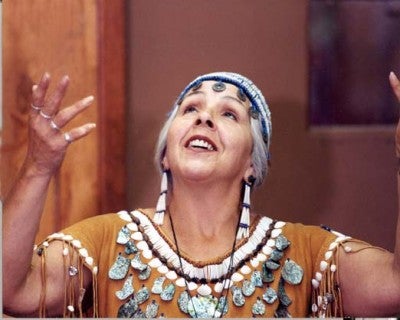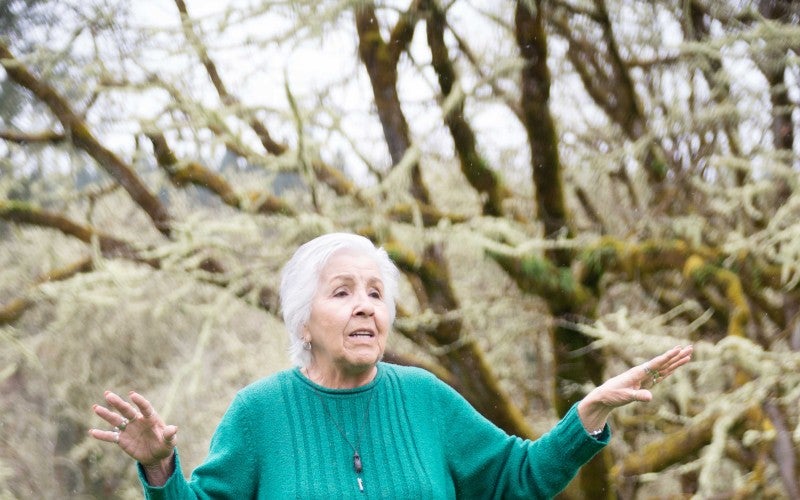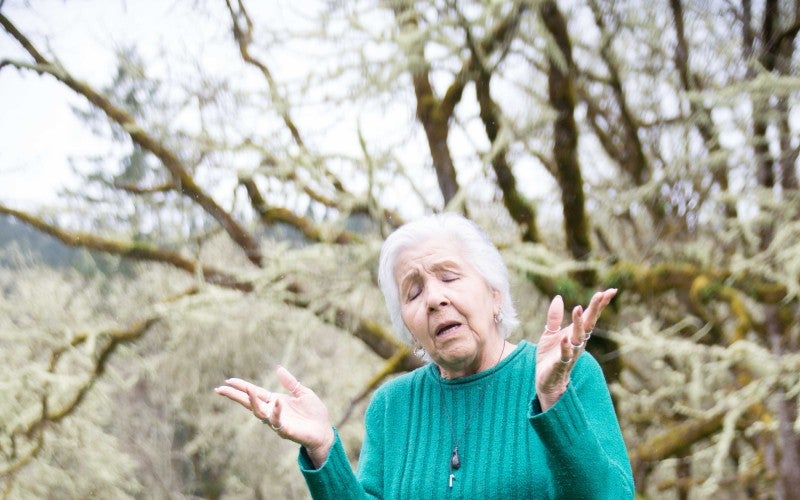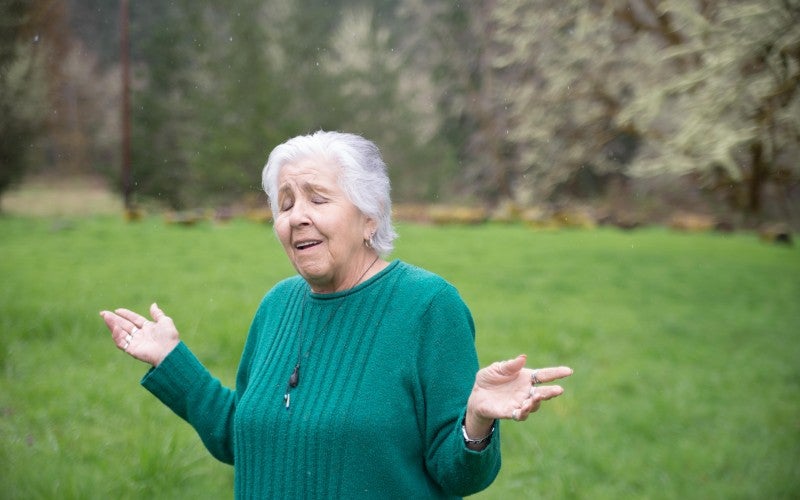Esther Stutzman (Yoncalla) is a traditional storyteller and educator. Stutzman, who is Komemma Kalapuya (from the Willamette Valley) on her mother's side and Hanis Coos from the Oregon coast on her father's side, is an enrolled member of the Confederated Tribes of Siletz Indians. Stutzman works with schools, museums, libraries, and universities to share her culture and history. She is also a founding member of the six-woman Old West Cowgirl band, Slow Ponies.
Bio
Esther Stutzman (Yoncalla) is a traditional storyteller and educator. Stutzman, who is Komemma Kalapuya (from the Willamette Valley) on her mother’s side and Hanis Coos from the Oregon coast on her father’s side, is an enrolled member of the Confederated Tribes of Siletz Indians. Stutzman works with schools, museums, libraries, and universities to share her culture and history; she is also involved in a Kalapuya language revitalization project. Stutzman is a founding member of the six-woman Old West Cowgirl band, Slow Ponies. For over 50 years, Esther Stutzman has told Kalapuya and Coos stories learned from family members and Tribal Elders. She provides an indigenous perspective for didactic tales and histories that dismantle stereotypes and bridge cultural chasms. She explains, "stories pass on history and lessons. Often, the stories detail epic adventures of tribal 'heroes and heroines' who possess moral values that are important to tribal unity. . . . And this storytelling consists of the stories that I've heard in my whole life, and I think they are really important, especially for the kids, because they pass on lessons. . . . And with these stories, the children are able to learn more about the culture and what we believe and the way that they should act. So when I do the presentations in the schools, I always emphasize this, that there's a lesson to every story and each lesson is important." Esther Stutzman learned her traditional stories from tribal elders, primary ethnological sources, and her grandmother. She stresses, "it is important for tribal stories to be passed orally from one person to another since the nuances and meanings of stories are often those things that can only be learned by listening to stories from an authentic voice." A founding member of the Northwest Indian Storyteller's Association She is also a Primary Storyteller for Mother Earth’s Children, an all-Indian repertory theater on Oregon's southern coast, and the founding director of the American Indian Youth Camp. Stutzman has consulted with local Indian Education programs throughout Coos County and beyond, presenting Native culture to provide authentic, living, and traditional stories within local schools. She has worked with field archeologists to gain additional insight into tribal history that has not survived through Tribal memory, and she has assembled with others a Tribal museum with which local schools can interact. Stutzman has also developed and published a unique series of curriculum guides addressing stereotypes, American Indian music, and Native perspectives on Columbus and Thanksgiving. Highlights from her long list of publications include When Grandmother Sang Her Song (Coyote Press, Empire, OR: 1977) and Ethnobotany of the Coos (Coyote Press, Empire, OR: 1988). Stutzman has been recognized as a leader by the Northwest Indian Storytellers Association (festival participant and facilitator for Emerging Traditional Storytellers Workshop), the Annual Traditional Ecological Knowledge in Ecosystem Sustainability Conference (speaker), and the Oregon Folklife Network/Program (master artist in the Traditional Arts Apprenticeship Program). In 2017, she was honored with the Governor’s Arts Award. An active performer, as well as educator, and consultant, Stutzman reaches an ever-growing audience as vocalist for the all-female "old western cowboy" musical act, Slow Ponies. The group performs for live music attendees at festivals and venues around Oregon and includes Stutzman’s longtime friend and neighbor Shannon Applegate (Governor's Arts Awardee 2006-2007), direct descendant of Oregon Trailblazer, Charles Applegate. Stutzman's collaborations with Applegate also include developing the "Two-Way-Seeing" bi-cultural public program for Oregon Humanities. Educator, community organizer, and cultural advocate, Esther Stutzman's lifework has been to reinvigorate Native cultural identity, especially for Native youth. Her life and accomplishments, from her art as a storyteller to her yodeling performances to her work as an activist re-writing the stereotypes at work in our mainstream education and curriculum, are a testament to her commitment to the power of the arts to bridge cultures and bring positive change.
Related Experience: Lectures and storytelling presentations for Oregon State University, University of Oregon, Lane Community College, Linn-Benton Community College, Applegate House Heritage Arts and Education Primary curriculum developer and instructor for Oregon South Coast Indian Education Culture Camps Oregon Historical Society’s Oregon Chautauqua series presenter Artist-in-Residence for Oregon public schools 2013 Folk Arts in the Parks presenter





